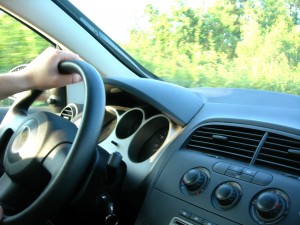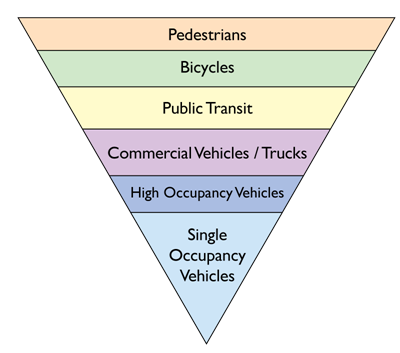 Taking Stock reveals the places where we drive the most miles each year. The three to five places with the highest total miles are the high impact trips. Changes in transportation on these trips, even for just one day a week, have the greatest potential to make a difference in air pollution and global warming.
Taking Stock reveals the places where we drive the most miles each year. The three to five places with the highest total miles are the high impact trips. Changes in transportation on these trips, even for just one day a week, have the greatest potential to make a difference in air pollution and global warming.
Since the 1950’s, our cities and transportation systems have been designed to encourage car-centric habits. Breaking these habits means doing some counter-cultural thinking, which is where Texans of faith have an advantage. The car is designed for a world that says we deserve everything cheap, fast, and convenient. Religious beliefs lead us to make choices that balance our wants with the needs of others and God’s intended order for the world, even when doing so requires personal sacrifice and discipline.
As people of faith, we have the benefit of religious and spiritual practices that have taught us how to make small, daily sacrifices for a greater purpose. These are the same kind of small, daily changes needed to break the car habit. Start by looking at the roundtrip distance for each of your high impact trips. The following table shows the options to explore based on distance.

Through reflection, prayer, and meditation, consider how you might move up the transportation hierarchy for your high impact trips.
 Walking
Walking
It takes about 20 minutes for the average person to walk a mile. The weather may be challenging, but with the proper precautions, consider walking to places within a mile (high impact roundtrips of 2 miles or less) as a spiritual practice for your health and the health of God's Creation. It’s also a great way to get to know your neighbors and neighborhood. Learn more about the benefits of walking for you, your community, and the environment.
4 Things You Notice When You Walk Instead of Drive
10 Reasons to Try Walking for Transportation
Bicycling
Trips of 0-5 miles are generally considered easy on a bicycle. Consider using a bicycle for high impact roundtrips of 10 miles or less. It takes a little planning to use a bicycle for trips, so here is one person’s story about biking to work, which gives helpful suggestions for biking any place. Looking at the numbers in detail, “biking is the big winner” when it comes to cost-effective transportation.
12 Reasons to Use a Bicycle for Transportation
A Beginner's Guide to Biking to Work
Public and Commercial Mass Transit
 Community is an important aspect of all the world’s major religions. Intentionally riding with people who may be different from you can help repair some of the isolation and polarization in our country and restore community, while reducing your impact on the climate. In addition, commute time becomes your time on mass transit, free of the frustration, stress, and hassles of traffic.
Community is an important aspect of all the world’s major religions. Intentionally riding with people who may be different from you can help repair some of the isolation and polarization in our country and restore community, while reducing your impact on the climate. In addition, commute time becomes your time on mass transit, free of the frustration, stress, and hassles of traffic.
Start by getting the bus or train routes for your community. Compare them to your high mileage locations. If there's a stop near any of them, then public transit is a potential option for that place. Find the nearest stop to your house, and then figure out the transit route. Taking a bus or train can be confusing the first time. WikiHow steps you through the process of riding mass transit, using a public bus as an example.
Public Transportation Benefits
Why Public Transportation Is Good for Kids
Mass Transit - Safer than Driving
Ride Sharing (High Occupancy Vehicles)
 Only half as many people car-pool today as did in the 1970’s; however, car-pooling may be making a comeback in the form of ride sharing. Technology now creates electronic bulletin boards for riders to find each other, and point-to-point shared ride services are quickly growing and evolving. Conside ride sharing as an option for any of your high impact places.
Only half as many people car-pool today as did in the 1970’s; however, car-pooling may be making a comeback in the form of ride sharing. Technology now creates electronic bulletin boards for riders to find each other, and point-to-point shared ride services are quickly growing and evolving. Conside ride sharing as an option for any of your high impact places.
We often think of ride sharing for work or school and forget to consider it for our place of worship. Even if the distance isn’t that far, the frequent trips to a place of worship can really add up. Ride-sharing to your place of worship with others in your faith community is a great way to build community and care for each other, while caring for God's creation.

